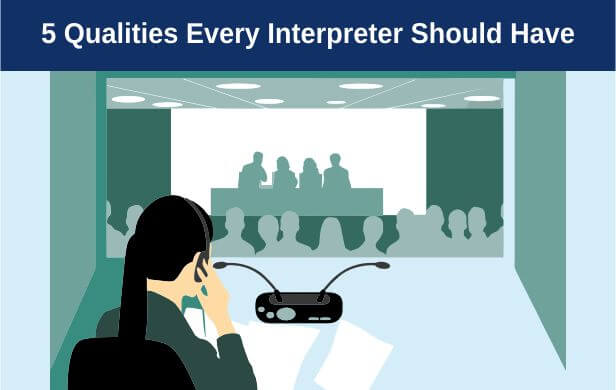
Speaking more than one language is an impressive feat. However, being a professional interpreter for different organisations and authorities is an even bigger feat.
Language interpreters relay ideas to foreign-language speakers across different environments. Interpreters are often also employed in healthcare settings and the courtroom to provide non-native speakers with a voice to communicate their message.
The job of a language interpreter, however, is not an easy task. Interpreters are required to do more than just translate languages orally. However, a career as an interpreter is among the most rewarding in the language services industry.
Keep reading to learn more about the top 5 most important qualities a good interpreter should have!
Seamless communication is essential to making a mark in the global corporate world. Professional interpretation services can enhance your brand image and foster remarkable cultural exchanges with foreign clients and parties.
Here are 5 qualities to keep in mind while looking for a professional interpretation service-
A good interpreter will have specialized knowledge in their specific field or industry. These industries include engineering, finance, law, and healthcare - among many others.
For successful communication, a good interpreter should convey technical information in another language accurately. Knowledge of the industry, as discussed, is fundamental to ensuring that communication takes place smoothly and with minimal errors.
A good interpreter will have a solid foundation in the origin and culture of the target language. As a result, these professionals contribute significantly to bridging cultural differences in corporate communication.
Interpreters also work to help all parties understand cultural references in professional settings.
Being able to facilitate a clear understanding of the host culture and language is one of the key skills that a good interpreter needs to have.
Professional interpreters act as an intermediary between two parties who do not speak the same language to achieve a set objective. They need to deliver in real-time, unlike translators who often work with written content.
For that reason, both simultaneous and consecutive interpreters should have excellent short-term memory and concentration.
A certification or accreditation from a reputed interpretation institution can be beneficial in establishing the skill & expertise of an interpreter. A professional who has undergone academic training will not only have a much better grasp of the language requirements, but they will also be aware of the code of ethics used by interpreters in the industry.
With the right accreditation and thanks to their experience, interpreters will make significantly fewer mistakes on the job. In a career like interpreting, it is important to ensure that the least amount of mistakes are made as errors can lead to consequences for the interpreters and the institutions they work at.
Finally, a good interpreter will have excellent listening skills. Listening skills are the most important skill required in the interpretation industry.
Attentive listening includes paying attention to every single detail on the job. Making sense of the information is vital to crossing communication barriers in business transactions.
Interpreters should also be able to catch information accurately in the context provided. Knowing the meaning of the words alone is not enough. A good interpreter will also be able to understand the intent and purpose behind the message clearly.
Additionally, an interpreter will often ask questions before the project begins and during the conversation. These questions help them understand clearly the message being conveyed so that the same can be translated without any errors.
In addition to the above key qualities, a good interpreter will have excellent soft skills. Interpretation situations can be challenging and intimidating for non-native speakers. Therefore, a good interpreter should be able to work towards creating a comfortable and seamless interpretation environment.
A good interpreter should also have the remarkable ability to connect with people from different walks of life.
As an industry, interpretation services often require professionals to adhere to a strict code of ethics. These rules and instructions must be always kept in mind.
Finally, a good interpreter will have the integrity and intuition needed to abide by confidentiality standards at all times strictly.
At Language Services Bureau, we understand how important it is to have the right kind of interpretation services. The quality of interpreters assigned to you can directly impact the objective you aim to achieve across different kinds of business transactions and fields.
Click here to learn more about the services we offer!
For any queries related to language translation services. Inquire at our email address below or give us a call today!
info@languageservicesbureau.com
Telephone: +91-20-24470509, +91-82370 60559
Similar articles for you...

आमच्या गेल्या महिन्यातील ब्लॉग मध्ये भाषांचे ज्ञान आवश्यक असणाऱ्या करियर क्षेत्रांची माहिती आपल्याला मिळाली. जिथे भाषेचे ज्ञान फायद्याचे ठरते असे इतर व्यवसाय आपण या महिन्यात पाहुयात.

Posted by : Language Services Bureau

The time it takes to learn a language depends on what you want to do with it– here is a great article about language learning and the kind of expectations you can set about the time required for the same!